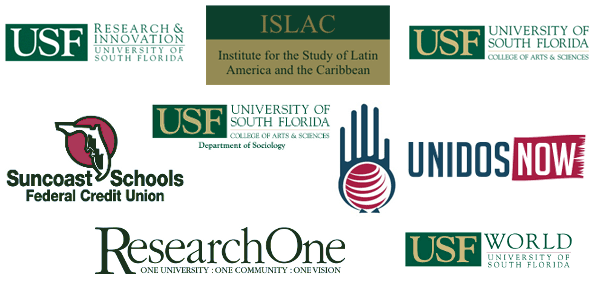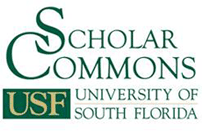
Latino Communities in Old and New Destinations: Multi-disciplinary Approaches to Assessing the Impact of Legal Reforms

NOVEMBER 8, 2013
VINOY RENAISSANCE SAINT PETERSBURG RESORT & GOLF CLUB
___________________________________________________________________________________The University of South Florida announces a multidisciplinary conference featuring:
CECILIA MENJÍVARCowden Distinguished Professor, T. Denny School of Social and Family Dynamics, Arizona State University
EDIBERTO ROMÁN
Professor of Law, Florida International University College of Law
___________________________________________________________________________________
REGISTRATION
Individuals who would like to attend the conference must register through the conference’s website. Pre-registration ends October 25th. The registration fee includes lunch, snacks, and refreshments in the morning and afternoon.
Conference registration is offered on a first-come, first-served basis until the limited seating capacity is filled. The registration fee is waived for USF students. Should you need assistance or have any questions, contact Elizabeth Aranda at earanda@usf.edu.
LOCATION
The conference will take place on Friday, November 8, 2013 at The Vinoy Renaissance Saint Petersburg Resort & Golf Club. St. Petersburg is located across the bay from Tampa’s international airport. The conference will begin at 9 a.m. and conclude after the keynote speeches at 6 p.m.
SPONSORS
LATINOS COMMUNITIES IN OLD AND NEW DESTINATIONS is sponsored by various entities within and outside of the USF-Tampa system. These include, USF Research and Innovation, USF College of Arts & Sciences, USF Department of Sociology, ISLAC, The Citizenship Initiative, USF Research One, and the Suncoast Credit Union.

CONFERENCE THEME AND PANELS
This one-day conference will feature four panels that will address a range of social policies at federal, state, and local levels and how various segments of the Latino population have fared in light of these policies. Panelists are among the top researchers in their fields who focus on communities of Latinos in both old and new places of settlement. They come from a variety of disciplines and methodological approaches.WELL-BEING AMONG VULNERABLE POPULATIONS AND COMMUNITY DYNAMICS
This panel addresses a range of legislative changes and subsequent consequences, and how they relate to individual-level outcomes such as psychological well-being and civic engagement. Panelists will explore how even policies that are meant to be inclusive have mixed effects when it comes to evaluating the well-being of Latino households, as in the case of mixed-status families and their access to services under the Affordable Care Act. Exclusionary practices, particularly those that target minority populations such as “Stop and Frisk,” also affect community life as social spaces become vulnerable places for Latinos/as, even in their own communities. Such polices do not just harm Latinos, but also destabilize diverse communities by creating perceptions of insecurity rooted in flawed social constructions of Latino/a immigrants.
LEGAL STATUS AND LATINA/O YOUTH OUTCOMES
In 2012 President Obama signed into order DACA, or Deferred Action for Childhood Arrivals, which called for the deferral of removal proceedings and a temporary legal status for undocumented youth who came to the United States as children and who are pursuing education or military service. This panel assesses the status of Latina/o youth who were eligible for DACA and those who did not meet the eligibility requirements. Although not a long-term solution to a broken immigration system, panelists will address the conditions under which DACA facilitates the integration of Latino/a youth and whether it improves their prospects for social mobility in the United States.
INEQUALITIES IN THE CRIMINAL JUSTICE SYSTEM
Policies at the federal and state levels have made routine activities such as driving a point of entry for Latinos into the Criminal Justice System. Whether it be through the denial of drivers’ licenses or racial and immigrant profiling practices, this panel illustrates the pathways of Latinos into the CJ System that produce and perpetuate inequalities. Panelists will also discuss another facet of this system—the process of being tried by a jury of peers. Case law is examined to understand how Latinos are unfairly under-represented in juries, revealing multiple dimensions of inequality faced at various ends of the CJ System.
IMPLICATIONS FOR IDENTITIES, INTRA-ETHNIC RELATIONS, AND SOCIAL INTEGRATION
The growth in the Latino population and the diversification of old and new immigrant destinations have implications for Latino/a identities as well as social relations within their communities. Anti- immigration legislation carries the potential to divide Latino communities, leading to cleavages within the population along the lines of nativity, national origin, and race. This panel seeks to understand whether and how Latinas/os join with segments of the population that face marginalization, or if they distance themselves from groups associated with stigmatized identities. Patterns of self-identification, experiences with discrimination, and social integration are examined in light of debates about identity politics and narratives of nativism.
SUBMISSIONS
Manuscript Submission is Now Closed
Revise Submission(s) Here
DESCRIPTION
Latinos/as in the United States are increasingly diverse with regards to their countries of origin, race, social class and immigrant status. Long-standing Latino communities in traditional ‘gateway’ cities are diversifying as they are receiving new Latin American immigrants at the same time that immigrant Latinos/as are establishing thriving communities in new destinations.
As Latinos in these communities incorporate into the United States, they encounter federal, state and local laws that are often in tension with one another. Homeland Security programs continue to result in detentions and deportations of undocumented immigrants and state laws modeled after Arizona’s S.B. 1070 continue to be proposed and passed; at the same time, recent federal initiatives are providing temporary legal status to select populations and new laws are expanding the social safety net for Latino/a citizens through reforms such as the Affordable Care Act of 2010. Moreover, immigration laws are often intertwined with policies that affect other realms of social life, such as education and social welfare. Unclear is how these recently enacted laws and initiatives are currently affecting and will continue to shape the various dimensions of Latino/a lives in both old and new destinations.
This conference seeks to bring together leading scholars who are researching a variety of social, economic and political issues confronting Latino communities in both old and new destinations to answer the question of how these laws, including current efforts at immigration reform, are affecting the lived experiences of Latinos/as—both recent arrivals as well as those who have been in the United States for generations. This will be the common theme uniting the conference panels.
To make a donation to cosponsor this conference, contact Ms. Christina Goldstein in the USF College of Arts & Sciences, Office of Development at cvgoldstein@usf.edu.
